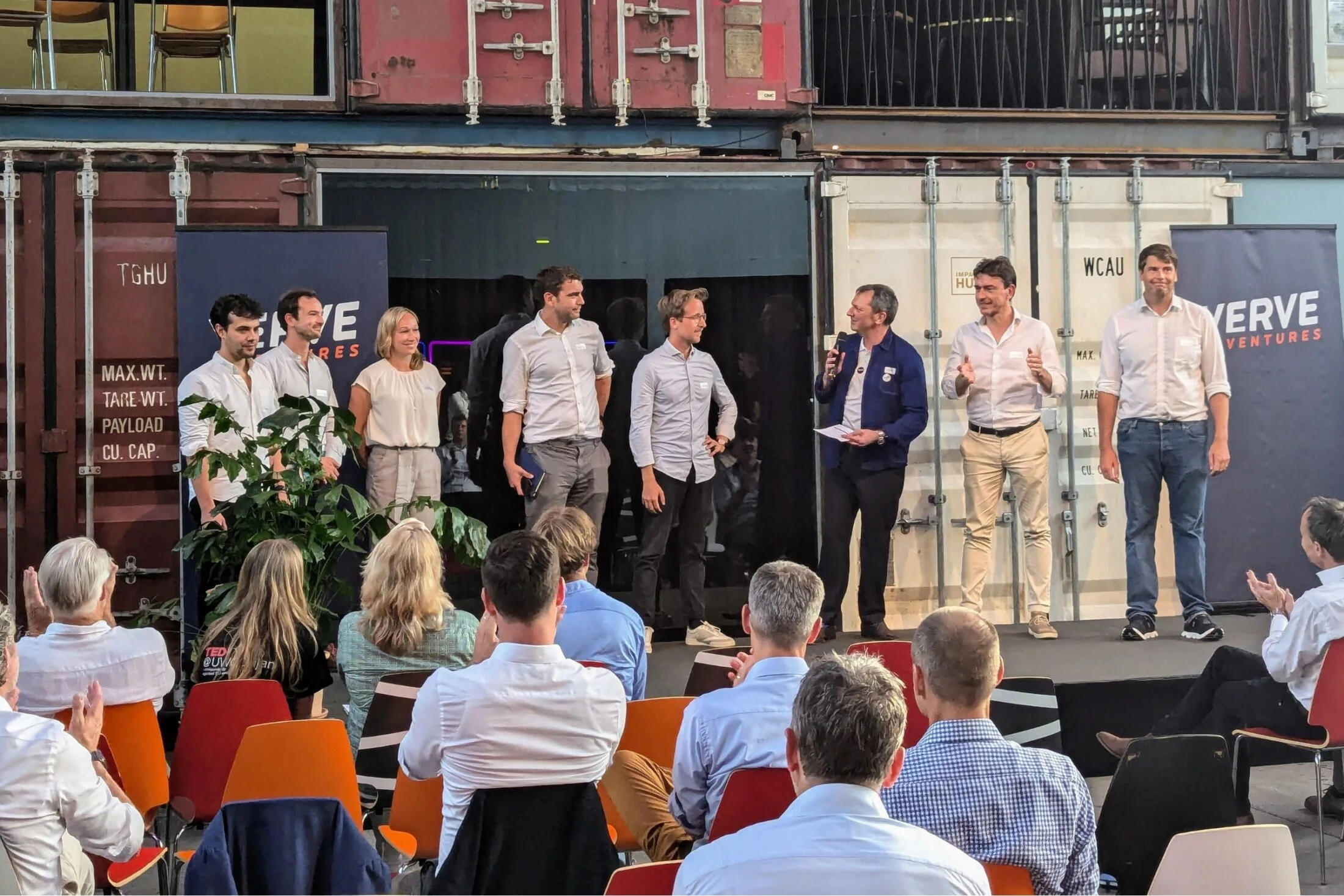Former tech entrepreneur Nicole Herzog prefers investing in startups rather than safe assets such as real estate. She argues that because entrepreneurs learn to cope with uncertainty and risk, they have a different mindset than traditional investors.

Entrepreneur and Business Angel
Nicole Herzog is a tech entrepreneur, board member, and business angel. She co-founded HR software company umantis which was later sold to Haufe, and she is the Chairwoman of Verve Ventures’ portfolio company Sherpany, a Software-as-a-Service startup based in Zurich. Sherpany has over 150 employees and supports clients such as Credit Suisse, Migros, and Helvetia in managing formal meetings of senior executives and boards.
What is your professional background and what led you to start investing in startups?
I studied law at the University of St. Gallen but realized I didn’t want to become a lawyer. Some colleagues of mine started the company btov Partners. Their idea, matching startups with investors online, was brilliant, but in 2000 the market was not yet ready. As a result, btov went offline and became a venture capital firm with a strong business angel network. I joined umantis as a co-founder, which was built on the same digital matching platform and evolved into a talent management software company. Years later, umantis was sold to Haufe, one of Germany’s leading software and media companies. This brought me independence and I started investing in startups.
“As an entrepreneur, you have a mindset that differs from that of a traditional investor.”
Why did you start investing in startups that carry high risk and not, say, in a safe and solid asset class like real estate?
As an entrepreneur, you have a mindset that differs from that of a traditional investor. You learn to cope with uncertainty and risk, and you focus on the opportunities instead of staying on the defensive. There is nothing wrong with investing in safer assets, of course. But I prefer having a bigger impact with my investment.
From the interviews I did for my book about intergenerational wealth I know that most people who inherit wealth see themselves as stewards of it. They feel obliged to pass it on undiminished to the next generation. Obviously, this makes them risk-averse. Would you say this is not the case for entrepreneurs with self-created wealth?
I agree that what you inherit comes with an implicit mission to safeguard it attached. This shapes one’s decision, but I assume it also makes you unfree to a certain extent. If you made the money yourself, it’s completely different, and in a way, much easier. You can choose your responsibilities and you’re fully in charge of what you want to do with it.
You said you feel comfortable with taking risks. What kind of risks can you handle, and which ones not?
There are risks and risks. To use an analogy, I would never go free solo climbing like the alpinist Ueli Steck. When it comes to investing, I shy away from biotech startups where the risks of failure and potential rewards are very high and these companies, by the way, need tremendous amounts of capital to get somewhere. Otherwise, I’m pretty open when it comes to different industries and business models. I don’t have to be an expert in the field of a startup I invest in because I like to team up with people who have complementary know-how. If you only invest in what you know best, you’ll get a field of vision that is too narrow.
Why invest in startups at all?
It depends on what you look for. If you invest in later-stage startups that are already pretty de-risked, it is not that far away from investing in the stock market. I prefer to invest in early-stage startups which I find more thrilling. As an investor in such companies, you can really make a difference and move things ahead by helping them. What you get back is positive, creative energy and excitement about the future you only find in the startup scene. And of course, I hope it will pay off financially as well.
And what have you learned about investing in startups since you began doing it?
I don’t invest alone anymore. I get excited very quickly but I’ve learned that excitement alone is a bad guide when it comes to investing. I like to discuss investment opportunities with people I trust, it serves as a very good corrective. When enthusiasm is based on the good outcome of a thorough analysis, then the outcomes tend to be better. In general, I would say investing in startups is difficult, it’s a special skill you need to learn. It doesn’t matter if you’re a successful entrepreneur or know a lot about the stock market. This is different, and you need to be ready to lose money with investments. The good thing is that there are organizations that allow you to minimize the risks of making very bad choices, like Verve Ventures or btov Partners.
You’re not just an investor, you also serve on several boards of directors, including Sherpany, a portfolio company of Verve Ventures.
After the sale of umantis, I was ready to tackle new challenges. I joined Sherpany’s board in 2013 because I liked the people and the product. Sherpany has become much more to me than just a board seat. In the past 9 years, I put in a lot of work and effort, and I could contribute to shaping the company. As a general rule, I only join startup companies as a board member if I’m also invested in the company. Startup boards are intense and also involve additional risks because of the personal liability of the board of directors.
Where does Sherpany stand today?
Sherpany has become Europe’s leading meeting management software for corporate leadership meetings. Our software is used to prepare and post-process management and board meetings, making them paperless and more effective. Agenda items and documents needed are made available beforehand digitally. Topics everybody agrees on don’t need to be discussed in the actual meeting. This means that the time in the meeting will be spent actually discussing complex problems and potential solutions. Today, Sherpany has more than 400 clients and 150 employees. In 2021, around 66’000 meetings have been made more efficient thanks to Sherpany.
Meetings are, let’s say, not necessarily everyone’s favorite use of time.
This remark shows how much of an impact meetings can have on your life, especially if they’re linked to negative emotions. People spend so much time in meetings. And indeed, many say: “Oh no, not another meeting.” This should convince people to make the best use of their meeting time, something Sherpany facilitates. For companies, meetings are a major success factor, while for employees, they can be a major stressor. For me, a meeting means getting something done together with other people. I love meetings. Humans cherish social interaction and exchanges with others. The literature says that we should have at least 5 meaningful interactions with other people per day. Covid was the best example of what happens when people are locked up in their homes.
You’re also a board member of the very successful Swiss eyewear startup VIU. How did you join that company?
The president of the board at that time, the co-founder of Haufe-umantis Hermann Arnold, introduced me to the founders of VIU. The team excited me, and I found their approach convincing, even though I’ve had no experience in the eyewear industry. I like to make founders successful and see them grow beyond themselves. With its direct-to-consumer model that takes out the middlemen, VIU has transformed the Swiss optician market. By now, VIU has close to 50 stores in the DACH region and is one of the Swiss brands that enjoy an excellent reputation.
Written by
Investors

Our sophisticated investors include visionary family offices, leading wealth managers, institutions, founders, and senior executives. These individuals and organizations are all committed to shaping the next generation of innovation.
More News
“I believe in the megatrend of sports data”
Former Mammut CEO Oliver Pabst thinks that smart textiles have reached a tipping point. The ability to measure our bodies’ vital signs not only improves our performance but also allows us to become part of a community. In this interview, he explains why he joined smart textiles startup Nanoleq as an advisor and investor.
“There is no good similar treatment”
Prof. Jonel Trebicka is an expert for liver diseases. He is supervising clinical trials of Versantis' new drug to treat an acute form of cirrhosis, which is very difficult to treat.
“We’re selling actionable information”
PathoQuest’s CEO Jean-François Brepson explains how a new test indirectly helps fight “superbugs” and why he left a big pharma company to lead a startup.


